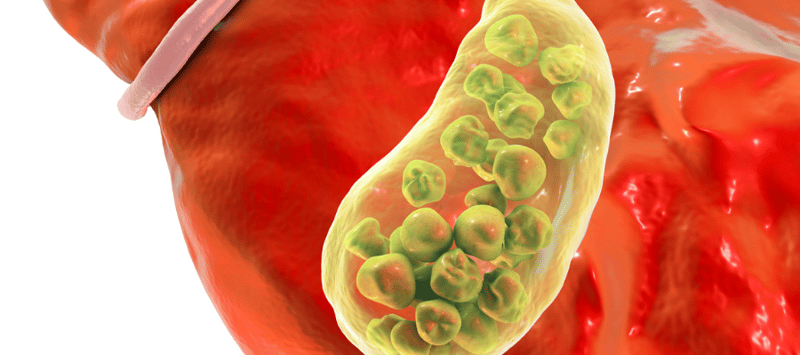
Gallstones. Cringe. A single word that brings to mind debilitating pain, discomfort, and worry for many.
Affecting millions of individuals around the globe, gallstones can feel like an insurmountable hurdle once you have discovered that they are an issue for you.
But don't lose heart. As we increasingly acknowledge the impact of holistic wellness, it becomes apparent that the power to conquer gallstones lies within us - our dietary choices to be precise. OnPoint, with a dedicated team of registered dietitians and nutritionists, have walked hand-in-hand with over 20,000 people on their journey towards better health. We know first hand the powerful impact that nutrition has on our overall wellness and even chronic conditions.
In this article, we are going to show you how you can use this power to help yourself and live a happier, healthier life.
Today, we extend our hand to you. Let's dive in!
Unraveling Gallstones: Understanding the Condition
Gallstones are small, hardened deposits that form in the gallbladder, a small organ under the liver. These stones can range in size from a grain of sand to a golf ball. They're formed when there's an imbalance in the substances that make up bile. Risk factors for developing gallstones include:
- being overweight
- rapid weight loss
- certain diets
- a family history of gallstones
Potential complications if left untreated include: inflammation, infection, and gallbladder cancer.
If gallstones block the bile ducts, it can cause a serious infection known as cholangitis, or lead to pancreatitis, an inflammation of the pancreas. Early diagnosis and treatment are crucial to prevent these severe complications, and in some cases, surgical removal of the gallbladder may be necessary.
Regular check-ups and maintaining a healthy diet can help in managing the risk of gallstones.
Role of Nutrition in Gallstone Prevention and Management
Diet plays a vital role in managing gallstones. It can help control some of the risk factors associated with gallstones, like being overweight, by encouraging weight management through nutritious food choices.
A healthy diet that emphasizes a balanced intake of fats, carbohydrates, and proteins can also prevent gallstones from forming in the first place. This is particularly important because certain dietary habits, such as consuming excessive fatty or cholesterol-rich foods, can lead to an imbalance in bile composition, thus creating an environment conducive to gallstone formation.
For individuals who already have gallstones, adopting specific dietary practices can ease symptoms and discomfort. By focusing on a diet rich in fiber, low in saturated fats, and including healthy fats such as omega-3 fatty acids, individuals can significantly reduce the likelihood of gallstone-related complications and enhance their overall digestive health.
Monitoring one's diet, along with regular medical check-ups, can form a comprehensive approach to managing gallstones, thus promoting better well-being.
Key Elements of a Gallstone-Friendly Diet
- High-Fiber Foods: Foods like fruits, vegetables, and whole grains can help keep your gallbladder healthy.
- Healthy Fats: While you need to limit unhealthy fats, incorporating healthy fats like olive oil, avocados, and nuts into your diet is beneficial.
- Lean Proteins: Choose proteins like chicken, fish, and beans, which don't have a lot of unhealthy fats.
- Complex Carbohydrates: Foods like brown rice and quinoa can provide the energy you need without causing gallstones.
- Limit High-Fat and High-Sugar Foods: They can lead to obesity, a risk factor for gallstones.
Lifestyle Changes to Support Gallstone Management
- Regular Physical Activity: Exercise can help you maintain a healthy weight, which reduces your risk of gallstones.
- Effective Stress Management: Techniques like yoga and meditation can improve overall health.
- Healthy Weight: Obesity increases the risk of gallstones. Losing weight in a healthy, gradual manner can reduce this risk.
- Hydration: Drinking plenty of water helps to flush out the system and keep the gallbladder functioning properly.
Consulting a Registered Dietitian to Manage Gallstones
Everyone's dietary needs and preferences are unique. That's why it's so important to get a personalized diet plan. A registered dietitian can assess your individual needs and preferences and create a diet plan that's just for you. They can also provide support and guidance along the way.
Living with gallstones needn't define of hinder your life. Armed with the right dietary choices and lifestyle modifications, the power to turn the tide is within your grasp.
Pain and discomfort -- make way for control and optimism. You can conquer this.
With every nutrient-rich bite you consume, you can take a step towards managing your discomfort and eventually living a gallstone-free life. Our team of dietitians and nutritionists at OnPoint, backed by expertise and having provided more than 20,000 individuals with healthful action steps, we are ready to guide you on your journey towards improved health.
Together, let's navigate the road to wellness.

With a knack for turning complex nutrition facts into engaging, relatable content, she’s on a mission to make healthy living fun and accessible. Backed by a stellar team of Dietitians and Nutritionists, Abby breathes life into OnPoint’s mission, inspiring others to embrace the transformative power of good nutrition. Her infectious enthusiasm and innovative approach make her a driving force in the journey towards better health for all.




